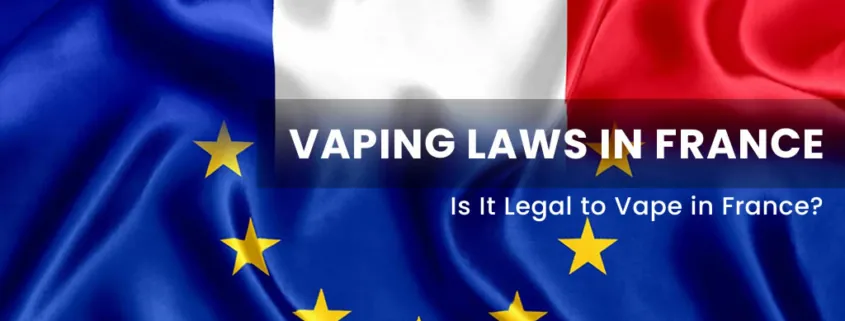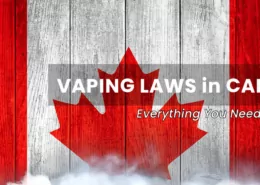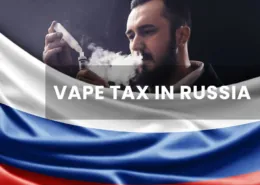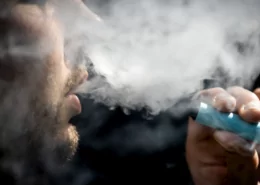Vaping Laws in France – Is it Legal to Vape in France?
Vaping has gained popularity as a smoking alternative in recent years, and it’s crucial to understand the laws and regulations around vaping in different countries, as they can vary significantly. In this article, we will explore the vaping laws in France and answer the question, “Is it legal to vape in France?”
History of vaping laws in France
When the electronic cigarette first arrived on the European market in 2005, it was not subject to any strict regulations. Vapers were allowed to vape wherever they wanted, and they could even fill the air with scented vapor as long as they were respectful.
However, the first laws regulating the use of electronic cigarettes appeared in 2016. According to ART.L 3513-5 and R. 3515-6 of the Public Health Code, the sale of vaping products to minors under the age of 18 is prohibited.
In October 2017, vaping became subject to laws that were almost as strict as those for conventional cigarettes. It is now forbidden to vape in enclosed and collective places. However, certain public places such as bars and cafes benefit from a relaxation of these rules.
Current vaping regulations
Under current regulations, vaping products in France are subject to the same rules as tobacco products. Vaping products cannot be advertised, and there are restrictions on their packaging and labeling. Vaping products are also subject to the same tax as tobacco products.
Age restrictions
In France, the legal age for purchasing vaping products is 18 years old. This law applies to all vaping products, including those that do not contain nicotine. The reasoning behind France’s vaping laws is to protect minors from a product with uncertain long-term effects and addictive properties. The electronic cigarette is seen as a risk reduction tool for adult smokers, not a fashionable accessory for young people.
ART L3513-5 of the French Public Health Code requires sellers to verify the age of consumers before selling vaping products. If the consumer is not of legal age, the seller must refuse the sale. While it is not illegal for a minor to purchase an electronic cigarette, it is illegal for a seller to sell or provide vaping products to a person under the age of 18. Violators can be fined up to 135 euros, with a possible increase to 750 euros.
It is also prohibited to vape in places where minors are present. This includes the following locations:
- Schools
- Apprenticeship training centers
- Establishments related to the training, reception, or accommodation of minors
These laws regarding the use of e-cigarettes seek to protect minors from a product whose risks are not yet fully known. Legislation on vaping joins the fight against tobacco and the general fight against the consumption of addictive substances such as nicotine.
Vaping regulations in the workplace
Since October 2017, vaping has been prohibited in enclosed and collective places, including workplaces, schools, and establishments that accommodate minors. The only exceptions to this prohibition are specific places such as company canteens, reception areas, and individual offices that may receive colleagues, cleaning agents, etc.
Employers are required to display clear signage indicating that vaping is not allowed in the workplace. Failure to comply with this law could result in a fine of €450. Employees caught vaping may be fined between €35 and €150, with the possibility of an increased fine. Labor inspectors and police officers may also visit companies to verify compliance with these regulations.
Employers may also sanction their employees for violating these regulations, ranging from a simple warning to dismissal.
Vaping is allowed under certain conditions in certain professional places. These include:
- Workers in the construction and outdoor professions
- Companies with dedicated vaping rooms
- Outdoor areas in companies (such as open parking lots or terraces)
Construction and outdoor workers are allowed to vape as their workplace is considered an open and outdoor space, exempt from the regulations of enclosed and collective spaces. However, vaping is prohibited if the work is carried out indoors, such as repairs in a client’s house. In the case of an outdoor but dangerous worksite, the employer may prohibit the use of e-cigarettes to ensure workplace safety.
Vaping is also allowed in certain designated areas within the company, such as a smoking area or an area specifically designated for vaping. The employer must follow certain rules, such as ensuring optimal ventilation of the room, an area of 20% of the total company area, or doors that do not open automatically.
Outdoor spaces such as the street, terraces, or open parking lots are also allowed for vaping, as they are open and do not fall under the conditions of vaping in enclosed and public spaces.
It is recommended to check the company’s internal regulations before taking a vaping break, and to ask the employer for permission if necessary, as they have the right to refuse.
Where you can vape?
Some public places have been authorized for vaping in France. The use of e-cigarettes is not prohibited by French law in certain enclosed public spaces, including:
– Bars and cafes
– Restaurants
– Nightclubs
– Hospitals and other healthcare facilities
– Shopping centers and other covered public places
– Stadiums
– Government buildings
However, the decision to allow vaping in these places is at the discretion of the venue’s management. Vapers should check the establishment’s website or inquire on-site to confirm if vaping is permitted.
It is worth noting that all managers of open or closed public spaces must clearly display the prohibition of vaping. If not, vapers are free to use their e-cigarettes. Despite this, most vapers tend to go outside when they want a dose of flavored vapor.
In theory, employees who work in these enclosed public places can vape in their professional space. However, it is advisable to always request permission from your employer or verify the internal regulations. Even if you are not allowed to vape during your working hours, you may do so during your breaks.
Advertising and Promoting Restrictions
In France, it is illegal to advertise or promote e-cigarettes and vaping products under ART. L3513-4 of the Public Health Code. This applies to both direct and indirect forms of advertising. However, there are some exceptions.
Vaping professionals, such as e-cigarette producers, manufacturers, and distributors, are allowed to advertise and promote their products. However, this is only permitted through online publications and communication services that are aimed exclusively at members of these professional structures.
Advertising e-cigarettes is also permitted for countries that are not members of the European Union or the European Economic Area, provided that the advertising is not targeted at the European market.
In stores that specialize in the sale of e-cigarettes, signage related to vaping is allowed. However, this signage must not be visible from outside the store.
Sponsorship and patronage that directly or indirectly advertise or promote vaping products are prohibited by law.
WHAT IS TPD?
The TPD, or Tobacco Product Directive, is a 2014 directive from the European Union that aimed to improve the regulation of tobacco products and related products such as e-cigarettes and e-liquids. The TPD was adopted into French law on May 19, 2016, through Ordinance No. 2016-623. As a result, new regulations were introduced to govern the sale and use of vaping products in France.
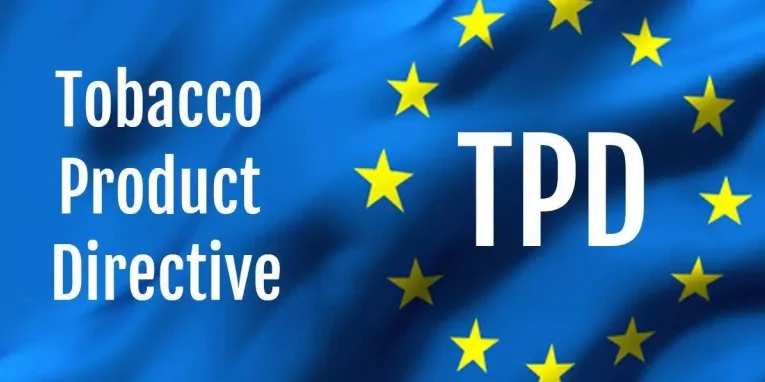
It legislates and regulates the production and sale of “vaping products.” This mainly concerns e-liquids that contain nicotine, cartridges, tanks, as well as all “devices without a cartridge or tank, which can be used, by means of a mouthpiece, for the consumption of vapor containing nicotine if applicable.”
Manufacturering and Selling
Since the TPD was transposed into French law, manufacturers and importers of nicotine-containing e-liquids are required to submit a market notification dossier to ANSES at least 6 months before placing the product on the market. The dossier must contain information on the product’s composition, toxicological data on the ingredients and emissions, and the manufacturing process. This is to ensure that the product complies with the relevant regulations and is safe for consumers.
According to the TPD regulations, nicotine e-liquid bottles in France are limited to a maximum capacity of 10 ml and must contain nicotine in a concentration of 20 mg/ml or less. The bottles must also have a safety device to prevent tampering and be designed to avoid leaks or breakage.
Additionally, the use of the word “Tobacco” or any reference to tobacco in the name of the e-liquid is prohibited, which has led to the term “Classic” being used as a replacement.
Disposable tanks and pre-filled cartridges containing nicotine e-liquid are also subject to restrictions, with a maximum capacity of 2 ml.
Packaging and Labelling
Under the TPD, e-liquid manufacturers, importers, and sellers are required to follow certain rules in order to market their products. These rules include the implementation of child safety features and protections against leaks on all e-liquid containers.
Additionally, e-liquid containers must include a label indicating the list of ingredients, the nicotine level, and the batch number. A warning about the dangers of nicotine consumption must also be displayed on the bottle.
Health warnings must be placed twice on each e-liquid bottle, and the manufacturer must include a recommendation to keep the product out of the reach of children.
A user manual must also be provided with each e-liquid, containing instructions for use and storage, contraindications and possible side effects, and a reminder of the toxic and addictive effects of nicotine on health. The manual must also include the contact details of the manufacturer or importer.
The legal status of vaping in France
Vaping is legal in France, but there are restrictions on its use and sale. Under current regulations, vaping products are classified as consumer products, and their sale is allowed in France. However, they are subject to the same regulations as tobacco products, including restrictions on advertising and packaging.
Different types of vaping products and their legality
There are several types of vaping products available in France, including e-cigarettes, refillable vaping devices, and disposable devices. All of these are legal to purchase and use in France. However, there are restrictions on the nicotine content of vaping products, and some products may not be legal if they contain illegal substances.
Laws surrounding nicotine-containing products
Nicotine-containing vaping products are legal in France. However, there are restrictions on the nicotine content of these products. The maximum nicotine concentration allowed in e-liquids is 20 milligrams per milliliter (mg/mL). This restriction is in place to protect against potential health risks associated with high levels of nicotine consumption.
The status of CBD-containing products
CBD-containing vaping products are legal in France, as long as they meet specific regulations. The products must contain less than 0.2% THC, the psychoactive compound found in cannabis. These products are subject to the same rules as other vaping products, including restrictions on advertising and packaging.
The Future of Vaping Laws in France
It is possible that vaping laws in France may change in the future. There have been discussions about further regulating vaping products, including potential restrictions on flavors and nicotine concentrations.
Potential impact on the vaping industry
Any changes to vaping laws in France could have a significant impact on the vaping industry. Restrictive regulations could make it more difficult for companies to operate in France, and could potentially limit the availability of vaping products for consumers.
Which countries ban vaping?
Some countries around the world have strict regulations and bans on electronic cigarettes. Travelers should be aware of the rules and regulations of the country they plan to visit to avoid any legal issues.
Countries such as Thailand, Cambodia, India, Indonesia, Singapore, Taiwan, Mauritius, Seychelles, Egypt, and Oman have banned vaping entirely, and severe penalties, including imprisonment, can be imposed on those who break the law.
In Australia, vaping is allowed only if the e-liquid does not contain nicotine. Japan and Malaysia prohibit the use of e-liquids containing nicotine. In countries like Mexico, Uruguay, and Panama, the sale of nicotine products for vaping is prohibited. In the United Arab Emirates and Finland, it is illegal to import vaping products.
It is always important to research and understand the laws and regulations of the country before traveling with vaping products. It is better to be safe than sorry and avoid any legal trouble while traveling.
Conclusion
In summary, vaping is allowed in France but it is subject to regulations and restrictions. E-cigarettes and related products are regulated similarly to tobacco products with restrictions on advertising and packaging. Vaping is not allowed in enclosed public spaces, and there are age limits for buying and using vaping products. It is important to be aware of the laws surrounding vaping in France if you intend to use these products while traveling there. It is also important to keep up with any changes in regulations that may occur in the future.
FAQs
Is it legal to vape nicotine in France?
Yes, nicotine-containing vaping products are legal in France. However, there are restrictions on the nicotine content of these products, and they are subject to the same rules as tobacco products.
Can I vape in public in France?
No, vaping is prohibited in all public enclosed.
Where Can You Vape in France?
In fact, vaping in public enclosed spaces is prohibited in France, including in restaurants, bars, and other establishments. The only exceptions are designated smoking areas in certain airports and train stations. Vaping is also prohibited in certain outdoor public spaces, such as schoolyards and playgrounds. It’s important to follow these rules and regulations to avoid any potential fines or legal issues.
Is it legal to sell vape in France?
Selling any vaping product, including “puff” devices, to minors is strictly prohibited in France. It’s crucial to understand that nicotine, which is present in most vaping products, is highly addictive. Therefore, it’s necessary to use these products responsibly and keep them out of the reach of children.
- Is It Illegal to Vape or Smoke While Driving in Minnesota? - August 15, 2025
- American Airlines Vaping Passenger Alleges Assault in Police Report - August 15, 2025
- NEXA PIX 35K Disposable Vape with Crystal Tank Review - August 15, 2025

